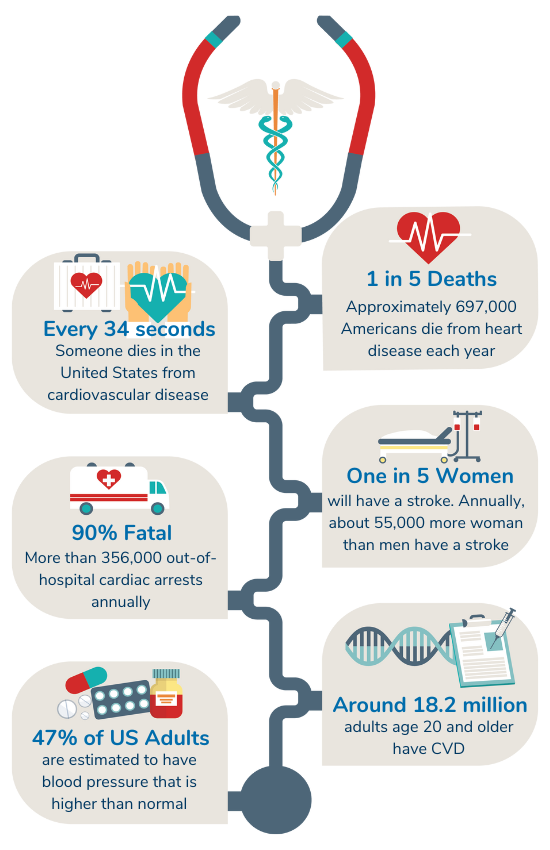Thinking about Valentines Day this week, protection is a word I’ve been thinking about recently. February is American Heart Month, a time to think about protection of your heart health.

Heart Health Matters
Heart disease is a critical national issue with one in four deaths in the US caused by heart disease. Research suggests that many lack education about cardiovascular conditions and warning signs.
By understanding the major risk factors for heart disease and making heart health a regular part of your self-care routine, you can protect your heart health and reduce the risk of heart disease. With small changes to your daily routine, you can make a big difference to your heart health and overall wellbeing.
This infographic from FEEA highlights current statistics.

Heart Disease Risk Factors
- High Blood Pressure also known as hypertension, this condition puts extra strain on your heart and blood vessels and can increase the risk of heart disease.
- High Cholesterol high levels of cholesterol in the blood can lead to the buildup of plaque in the arteries, which can increase the risk of heart disease.
- Diabetes people with diabetes are at higher risk of developing heart disease because high blood sugar levels can damage blood vessels and nerves that control the heart.
- Smoking smoking is a major risk factor for heart disease as it damages the blood vessels and makes them more prone to blockages.
- Obesity being overweight or obese can lead to a variety of health problems, including heart disease.
- Family history of heart disease if your parents or siblings have had heart disease, you may be at higher risk of developing it yourself.
- Physical inactivity a lack of regular physical activity can increase your risk of developing heart disease.
HEART HEALTH RESOURCES
- PREVENT HEART DISEASE By living a healthy lifestyle, you can help keep your blood pressure, cholesterol, and blood sugar levels normal and lower your risk for heart disease and heart attack. The CDC guides you through choosing healthy habits and taking charge of your medical conditions. >>Learn More
- KNOW YOUR RISKS Some risk factors for heart disease cannot be controlled, such as your age or family history. But you can take steps to lower your risk by changing the factors you can control. The CDC runs through the various risk factors. >>Learn More
- EATING HEALTHY Healthy eating starts with healthy food choices. You don’t need to be a chef to create nutritious, heart-healthy meals your family will love. The American Heart Association guides you through what to look for at the grocery store, restaurants, your workplace and any eating occasion. >>Learn More
- FORMING HEALTHY HABITS Along with eating right and being active, real health includes getting enough sleep, practicing mindfulness, managing stress, AND keeping mind and body fit. The American Heart Association has resources to guide you through positive steps to build a healthier life routine. >>Learn More
- WORLD HEART DAY HEALTH LEAFLET Download this informational guide from the World Heart Federation with tips on eating well, getting active, quitting tobacco. >>Download

Protection for You
On a call this week, a group of us were discussing heart health. A woman mentioned the “nitric oxide dump” exercise to much laughter in the group! Her doctor recommended it to open up her blood flow and improve her cardiovascular, nervous and immune systems.
The laughter continued as all of us on Zoom began to follow her lead for a few minutes. We agreed that every little bit helps, even when the name of the exercise was questionable 😄
On a more serious note, knowing about your family history can play a big role in your protection. My family has a history of heart “issues” throughout the generations. Knowing this helps me pay attention and inform my primary care physician to keep an eye out with me.
One of the little (big) things I recommend to my clients is to keep a record of all your personal health history (you, your parents and grandparents) for you and your family. Include surgeries, any prescriptions (and dosages) and conditions on “watch”. Share this information with trusted people (Power(s) of Attorney and/or In Case of Emergency Contacts) in case of emergency.
A great way to protect your heart health is to invest in understanding your risks and focus on your lifestyle. Know the warning signs: chest discomfort, extreme fatigue, nausea, shortness of breath, angina, indigestion, pain in the upper neck, shoulders, jaw or teeth.
Protecting you includes having your ducks in a row at home and work in case something impacts you quickly. Taking a proactive approach brings relief and a sense of peace. If you’d like to discuss ways to get started, email me: Lynn@thelivingplanner.com or if prefer to schedule a Complimentary Discovery Call to discuss your particulars, let’s do it!
My main website is: https://thelivingplanner.com. If you’d like to try a DIY approach, check out my online courses/resources to assist people, pets and businesses here: https://courses.thelivingplanner.com
The Dali Lama speaks of compassion in this quote, “If you want others to be happy, practice compassion. If you want to be happy, practice compassion.” This sounds like a good way to start the week! -Lynn
#LifeHacks #CareForPeopleCareForBusiness
